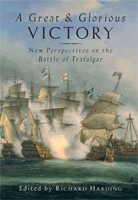1) First of all, why was this collection of essays published?
The bicentenary of Trafalgar produced an unusually rich output of research. Naval battles of the nineteenth century do not normally generate that kind of interest, but on this occasion scholars of many nations and with many different special research interests contributed to enriching our understanding of the battle. Equally important, this output reflects what the battle means people today. This collection of essays was a snapshot of the work as the year drew to a close and is representative both of the work done on the battle itself and on the impact of the battle in Britain and France at the time and later.
2) And what does this collection of essays represent?
As noted above, these essays represent the variety of scholarship that was brought to bear on the subject as a result of the centenary. It was not just a naval commemoration, nor purely British, but stimulated thinking about the critical events of 1805 much more widely.
3) You mention in your introduction that these essays are starting points for further research: where does the study of Trafalgar go from here?
These essays suggest a number of ways forward for further research. At the naval/operational level, the detailed work on the logs and the use of a computer programme provides an exciting blend of new technology with traditional scholarship to understand more fully many other naval battles. The critical examination of logs and accounts should also be applied to our understanding of other battles. Nelson's leadership has been studied in more detail than almost any other commander of the period (of course – Napoleon excepted!) The application of contemporary work on leadership to other naval and military figures is clearly an important way forward for research. The examination of French activity at home during the campaign and the use Napoleon made of the enforced idleness of his army in Northern France, shows that it is important not just to look at the action, but what is done as a result of inaction. This is another promising avenue for additional research. The commemoration of Trafalgar as a battle is a subject for study in its own right and the comparison with the French commemoration of Austerlitz has highlighted the need for more work on ‘memory' of battles, campaigns and wars. The success of the conference, together with other publications, has led to the establishment of the Nelson Legacy Conference Series, sponsored by the Society for Nautical Research, The 1805 Club, The Nelson Society and the Royal Naval Museum to develop these themes for research. The first conference looked at the Nelson Legend and the next will look at power projection from the Sea (September 2009 at Portsmouth).
4) How important was it for you that the collection have an international flavour?
The international flavour was vital – the French and Spanish contributions not only give us much more depth in understanding the battle as it took place, but enable us to see how the battle was viewed in Europe. It also gives us a much better idea of the impact of the battle on European politics. Trafalgar was an event of international proportions, but it rapidly became encrusted with myth and legend, which only international scholarship can help us correct.
Click here for more information about the book.


